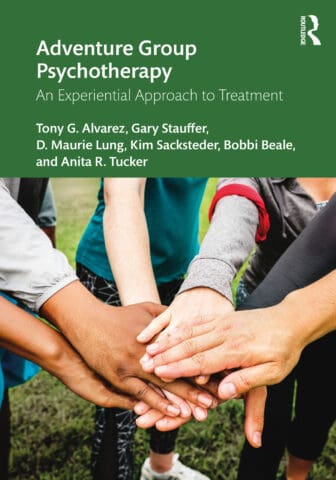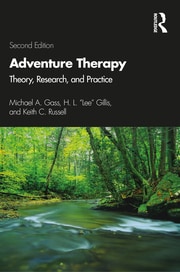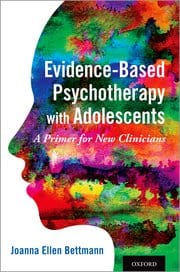OBH Center Research Scientists and Affiliated Researchers have published numerous books focused on various topics in adventure therapy and mental health.

Adventure Group Psychotherapy: An Experiential Approach to Treatment explores what is necessary for an experiential therapy group to function effectively, and the practical skills needed to inspire success.
The authors describe how to use activities in a manner that produces the greatest opportunity for clients to reach their goals. Issues such as how to actively assess client functioning in the group, how to select the appropriate activity, how to shape an effective environment, and how to help clients process their experience are a few of the aspects examined to help clients move toward their goals. The practical skills the authors describe enable readers to immediately learn and apply their practice with groups.
This book will be an important tool in any group therapy class, in practice settings to train practitioners, and for any clinician trying to expand their group work capabilities.
Alvarez, T. G., Stauffer, G., Lung, M.D., Sacksteder, K., Beale, B., Tucker, A.R. (2021). Adventure Group Psychotherapy: An Experiential Approach to Treatment. New York: Routledge/Taylor & Francis Group.

Adventure Therapy: International Perspectives and Diverse Approaches
Adventure Therapy around the Globe is an important, peer-reviewed collection of papers pulled from the from the 5th and 6th International Adventure Therapy Conference proceedings. These papers present international perspectives and diverse approaches to adventure therapy theory, practice and research. Adventure therapy program models and interventions from around the world are presented here to help adventure therapy practitioners develop new ideas and approaches for helping participants find healing and enhance wellbeing in the natural world.
Norton, C.L., Carpenter, C., Pryor, A. (2015). Adventure Therapy around the Globe: International Perspectives and Diverse Approaches. Champaign, IL: Common Ground Research Networks. doi:10.18848/978-1-61229-774-3/CGP.

Innovative Interventions in Child and Adolescent Mental Health is a unique composite of the literature on various innovative interventions for children and adolescents, and provides a developmental and neurobiological rationale for utilizing innovative interventions with this population. Based on the latest research, this book emphasizes that children and adolescents need more than just talk therapy. These innovative interventions can be applied in a variety of practice settings including schools, juvenile justice, community-based counseling centers, and residential treatment. This book bridges the gap between theory and practice, and provides a historical, theoretical, and research-based rationale, as well as a helpful case study, for each type of intervention being discussed.
Norton, C.L. (2011). Innovative Interventions in Child and Adolescent Mental Health. New York: Routledge/Taylor & Francis Group.

Adventure Therapy: Theory, Research, and Practice
This revised text describes the theory substantiating adventure therapy, demonstrates best practices in the field, and presents research validating the immediate and long-term effects of adventure therapy.
A leading text in the field of adventure therapy, outdoor behavioral healthcare, and wilderness therapy, the book is written by three professionals who have been at the forefront of the field since its infancy. This new edition includes fully updated chapters to reflect the immense changes in the field since the first edition was written in 2010. It serves to provide information detailing what is occurring with clients as well as how it occurs.
This book provides an invaluable reference for the seasoned professional and is a required source of information and examination for the beginning professional. It is a great training resource for adventure therapy practices in the field of mental health.
Gass, M., Gillis, H. L., & Russell, K. C. (2020). Adventure therapy: Theory, research, and practice (2nd ed). Routledge/Taylor & Francis Group.

Evidence-Based Psychotherapy with Adolescents: A Primer for New Clinicians
This text helps new clinicians working in any treatment setting learn how to conduct psychotherapy with adolescents from a place of understanding and empathy. In addition to addressing adolescent development, psychological theories in practice, neurobiology of adolescents, clinical assessment, and evidence-based treatment approaches for a range of common mental health concerns, the text explains how to build therapeutic alliances with adolescent clients and work with vulnerable populations commonly seen in treatment.
A complete guide that empowers readers with the insight and tools necessary to support adolescents as they progress towards adulthood, this book effectively builds the core skill sets of students and new clinicians in social work, psychology, psychiatry, and marriage and family therapy.
Bettmann, J.E. (2019). Evidence Based Psychotherapy with Adolescents: A Primer for New Clinicians. Oxford University Press.

Attachment-Based Clinical Work with Children and Adolescents is a wide-ranging look at attachment theory and research, its application to youth populations, and its natural fit with the social work profession. This book covers the applicability of attachment theory to the profession’s various domains that include human behavior, practice, policy, research, and social work education. In particular, it addresses the broad spectrum of clinical social work, including practice in a variety of public and private settings and with a number of diverse populations. The book highlights the contribution of the social work profession to the development of attachment theory and research.
Bettmann, J.E., Friedman, D.D. (2013). Attachment-Based Social Work with Children and Adolescents. Springer-Verlag New York.
